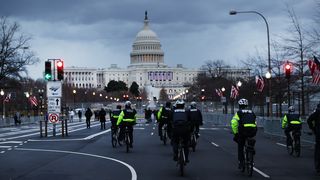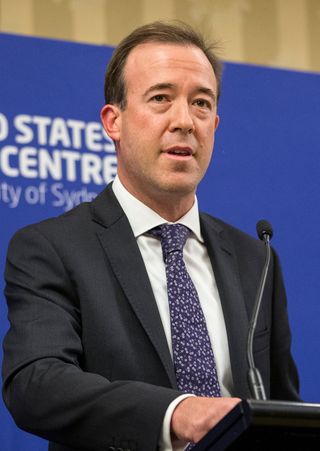Turn over an American one-dollar bill and you’ll find an image from the United States’ Great Seal. An unfinished pyramid, its apex floats separately above the base and features the eye of divine providence. Latin inscriptions above and beneath decree that "God has favoured" this "new order of the ages".
One of the more pervasive reactions to the violence in Washington in recent weeks has been to call time on American exceptionalism. No less a figure than Richard Haas, president of the Council on Foreign Relations, believes that what happened "should put an end" to the notion of America as "an eternal shining city on a hill".
Now the Trumpians who ransacked the seat of American democracy, along with the wrecking ball Trump himself has swung through American competence over the past four years, have so shattered Washington’s confidence that it threatens the country’s ability to reconstruct.
Viewed in the light of the past four years, that image on the dollar bill might also be seen to reflect how much the Trump White House from day one was isolated and disconnected from the civil service, with a consequent deep, administrative dysfunction.
As Edwin Feulner, the long-standing leading light of the conservative Heritage Foundation, said recently: "This guy was totally unaware of both the machinery that is available to him and how the whole team should be working together."
Now the Trumpians who ransacked the seat of American democracy, along with the wrecking ball Trump himself has swung through American competence over the past four years, have so shattered Washington’s confidence that it threatens the country’s ability to reconstruct.
So when watching Biden as he stands in front of the Capitol to deliver his inaugural address spare a thought for his speechwriters.
They will know Trump put the match to a gunpowder trail stretching all the way back to the cultural, racial and economic turmoil of the 1960s and beyond.
But like all inaugural addresses, every word and phrase will be parsed for what they portend.
No matter how powerful or stirring the rhetoric, the new President knows before a word is uttered that many Americans will neither listen nor grant him legitimacy.
'Around us empty lives, wanting fulfilment'
If there is an address Biden and his writers should read it is not John F. Kennedy’s of January 1961, still the gold standard for inaugurals, with its Cold War call for a "long twilight struggle". Nor is it Lincoln’s Second Inaugural of 1865 in the final year of the Civil war, however much Biden too may "fervently pray" that the scourge facing him: a rampant pandemic and a broken polity, "speedily passes away".
Rather it is Richard Nixon’s first inaugural of January 1969. However improbable that may seem because of Nixon’s torching of propriety and honesty in his own presidency, there are resonances for this moment.
Not since Nixon has a president taken office amidst such a divided nation. In his speech, Nixon spoke of a "long night of the American spirit" following civil rights protests and the anti-Vietnam war movement. But unlike Biden, Nixon played no small part in fuelling the very discord from which he sourced so much electoral gain.
However much his defeated Democratic opponent, vice-president Hubert Humphrey, must have choked on Nixon’s words that day, Biden might recognise some of what Nixon spoke on the occasion.
Not since Nixon has a president taken office amidst such a divided nation. In his speech, Nixon spoke of a "long night of the American spirit" following civil rights protests and the anti-Vietnam war movement.
Nixon saw "around us empty lives, wanting fulfilment". During "difficult years," he said, "America has suffered from a fever of words: from inflated rhetoric that promises more than it can deliver, from angry rhetoric that fans discontents into hatreds, from bombastic rhetoric that postures instead of persuading." To "lower our voices," he said, "would be a simple thing."
As historian Rick Perlstein observed, the speech was a "paean to the glory of quiet".
Nixon didn’t get it. Not then, not ever. He could not live up to his words. His motorcade back to the White House after the ceremony was pelted with beer cans, stones, sticks and firecrackers.
Biden, too, will hardly find moments of repose in his presidency.
Nixon concluded that the country’s destiny offers "not the cup of despair but the chalice of opportunity".
Joe Biden will have a limited timeframe in which to fill the chalice now his.
At home, his benchmarks will surely be to bring the pandemic under control, with a vaccine rollout that can end lockdowns by mid-summer. He will want employment to be rising from mid-March.
Piecemeal foreign policy
Abroad, the question will be whether the old bromides of reassurance work anymore. But given the lack of alternatives that Australia and many Asian and European allies have in terms of their security, much rides on Biden’s success or failure. If he fails, the uncertainty of the past four years about American staying power can only soar.
That many of the Obama national security cracks have gathered to the fray offers a sharp contrast to the Trumpian pirates that took over the ocean liner of American foreign policy. No new Kissinger, however, will be able to draw grand strategic pictures or do the big deals. The Biden administration's approach is likely to be piecemeal, especially on China. There will be room for co-operation on some matters, limited public space to move on others.
The outgoing administration has even taken to declassifying a document that purports to show its deep, long-term thinking on the region. The excitement here over this release, the haste to declare it a "world exclusive", misses the point that it offers but a glimpse – and not a terribly new or well-developed one at that – of American policymaking. It is only what the Americans wanted us to see.
By doing so, the outgoing Trumpians may have wanted to offset the view among those who, like Haas, believe that the age of American predominance is over.
Richard Nixon called for the building of a "great cathedral of the spirit ... each of us raising it one stone at a time". He was, of course, to destroy much of that himself. Joe Biden faces an altogether different, near impossible task of rebuilding now.






